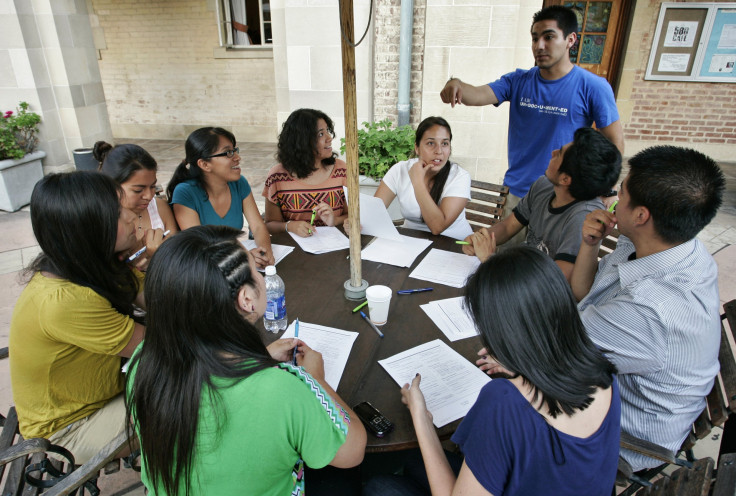Immigration Lawsuit Against Obama: Confusion, Fear After Federal Judge Blocks Illegal Immigrant Policies

Immigrant advocacy groups said they were confident Tuesday that President Barack Obama’s latest executive actions on immigration would eventually be enacted despite a Texas federal judge issuing a preliminary injunction late Monday that put the policy on hold two days before registration was set to start. But some illegal immigrants said they were losing hope that they would be able to apply for the programs that prevent their deportation.
The Obama administration said Tuesday that it will comply with U.S. District Court Judge Andrew S. Hanen's injunction while it appeals the case. "I strongly disagree with Judge Hanen’s decision to temporarily enjoin implementation of Deferred Action for Parents of Americans and Lawful Permanent Residents (DAPA) and expanded Deferred Action for Childhood Arrivals (DACA)," Department of Homeland Security Secretary Jeh Johnson said in a statement on Tuesday. "The Department of Justice will appeal that temporary injunction; in the meantime, we recognize we must comply with it."
Judge Hanen said Texas and 25 other states that sued the federal government showed that it is likely that they will suffer “irreparable harm” from the effects of the deferred action programs. But immigrant groups accused Hanen of “cherry-picking evidence” in favor of Texas, such as the burden of providing driver’s licenses to illegal immigrants and overlooking the economic and public safety benefits of the deferred action programs.
“The federal court has put the lives and livelihoods of millions of immigrant families temporarily on hold,” said Marielena Hincapié, executive director of the National Immigration Law Center, which filed an amicus brief in support of Obama’s proposal. Hincapié said one of the goals of Texas’ lawsuit was to create an atmosphere where illegal immigrants would be reluctant to apply for legal protections. “The intention is to create confusion and fear in our communities,” she said.
Others also said they were worried that the ruling would deter some illegal immigrants from eventually applying for deferred action. Michael Wildes, managing partner of Wildes & Weinberg, a New York City-based immigration law firm, said in an email that some of his clients were losing hope. “Many are hesitating to move forward,” he said.
Obama’s executive actions on immigration announced in November would allow illegal immigrants who were brought to the United States as children to apply for an expanded program known as DACA. It would prevent their deportation for three years and give them consideration for work permits. A similar but separate program for illegal immigrant parents who have children that are legal, known as DAPA, was set to start enrollment in May.
The new policy aimed at immigrants brought to the United States as children mirrors a similar program launched by Obama in 2012. The injunction doesn't apply to illegal immigrants who fit the criteria of that program, which covers those who are under 30 years old and doesn't have an expiration date. It also doesn't apply to those who have already received deferred action and want to extend their benefits.
But Monday's ruling may cause many immigrants not affected by the decision to believe that all of Obama's immigration programs have been blocked by the lawsuit, according to Vanessa Esparza-López, supervising attorney at the National Immigrant Justice Center, which also filed an amicus brief in support of the programs. "This will lead to a lot of confusion in the community. Our focus right now is to continue that outreach that we’ve been doing," she said.
Advocacy groups said they would urge immigrants to continue preparing to enroll, according to Debbie Smith, associate general counsel for the Service Employees International Union, which also signed an amicus brief in support of the programs. “This is the beginning of a fight,” she said.
When the federal government files its appeal, it will be heard in the Fifth Circuit U.S. Court of Appeals in New Orleans, which is closed Tuesday for Mardi Gras but is accepting filings for “emergency matters,” which would include the Justice Department’s appeal. A decision on an appeal is not expected to come in time for the planned registration rollout on Wednesday, according to Melissa Crow, legal director of the American Immigration Council, another group that filed an amicus brief in support of the executive actions.
The Department of Homeland Security, the agency that would have implemented DACA and DAPA, indicated that the Justice Department would not be seeking a stay, which would have blocked Hanen's injunction and allowed DHS to start accepting applications if a judge ruled in the government's favor.
It may take “several months” for a court to rule on whether Obama’s actions are illegal as asserted by Texas and 25 other states, Crow said. The losing side in the case is expected to ask the U.S. Supreme Court to weigh in, although it’s hard to say whether the high court would consider it.
Despite the injunction, there was optimism among immigrant advocacy groups that the executive actions would eventually be deemed legal. United We Dream called the injunction simply “a bump in the road.”
“Today, a single Texas judge may have delayed the applications for executive action, but United We Dream hasn’t delayed anything," said Managing Director Cristina Jiménez in a statement. "Preparation for executive action is going full steam ahead.”
© Copyright IBTimes 2025. All rights reserved.






















